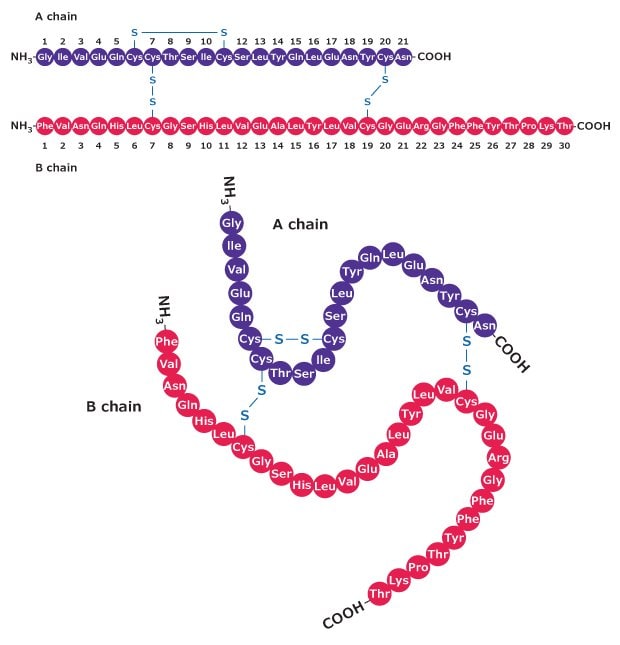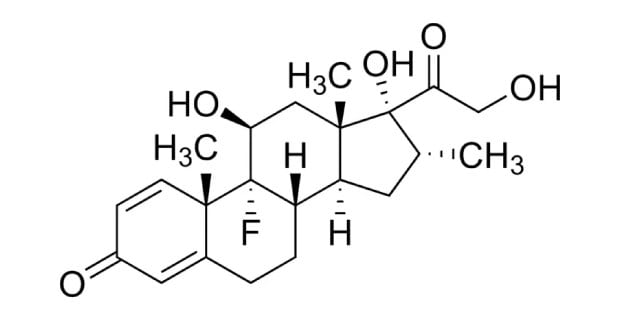Insulin and Dexamethasone in Cell Culture
Section Overview
Human Insulin
Insulin is a hormone peptide that plays an essential role for many biological processes in vertebrates. It is involved in glucose uptake and homeostasis, helping to maintain the overall metabolic balance. Insulin regulates metabolism and gene expression in the cell, coordinating cellular responses to nutrients and energy availability. It is also known to have anti-apoptotic effects and to stimulate protein synthesis, helping to maintain proper tissue health and biological functions.
Human Insulin Structure
Human insulin is composed of two polypeptide chains, labeled A and B. The structure includes two inter-chain disulfide bonds and one intra-chain di-sulfide bond on the A chain. With a total molecular weight of 5807 Da, the A chain of human insulin contains 21 amino acids and the B chain contains 30 amino acids.

Figure 1.Insulin structure
Human Insulin in Cell Culture
Insulin is a component of the culture media supplement fetal bovine serum (FBS) in cell culture applications. Insulin plays several important roles in culture, as it supports cellular metabolism, growth, and differentiation. For many commonly used cell lines, such as HeLa cells, the insulin in FBS is sufficient to support healthy cell growth. There are, however, several cell lines that benefit from additional insulin supplements in the media to support optimal growth and differentiation. These cell lines include those commonly used in research related to diabetes, obesity, and metabolic disorders, as human insulin plays a critical role in cell metabolism and function.
In specific cases where cells require additional insulin, including culturing pluripotent and neural stem cells, hepatocytes and hepatoma cells, CHO cells, and HEK293 cell lines, supplementing the culture media with the required levels of insulin is common. This adjustment helps to ensure that these cells can grow and maintain their desired characteristics effectively. Insulin can be added to media for serum-free cell cultures.
Insulin is also a common supplement in biopharmaceutical applications, as it helps improve the performance of cell lines to achieve higher yields of the desired protein.
Human Dexamethasone
Dexamethasone is a synthetic glucocorticoid that is commonly added to cell culture media for its effects on cell differentiation, proliferation, and survival. The hormone is often used in cell culture to study apoptosis, cell signaling pathways, and gene expression. Several cell types require dexamethasone supplementation to the media, including adipocytes, chondrocytes, osteoblasts, lymphocytes, neural progenitor cells, macrophages, endothelial cells, and hepatocytes.
Human Dexamethasone Structure
Human dexamethasone is not a water-soluble molecule. However, it is soluble in ethanol, methanol, acetone, dioxane, DMSO. It is also slightly soluble in chloroform.

Figure 2.Molecular structure of dexamethasone.
Human Dexamethasone in Cell Culture
Dexamethasone supplementation in cell culture media varies depending on the type of cell line that is being cultured and the specific research goals of the experiment. While dexamethasone has specific benefits in certain contexts, it is not universally applicable to all cell lines and should not be used in all applications. The effects of dexamethasone can vary significantly depending on the cell type, concentration, and experimental conditions; researchers should carefully consider using it based on the specific characteristics or requirements of the cell lines they are working with.
Related Products
To continue reading please sign in or create an account.
Don't Have An Account?